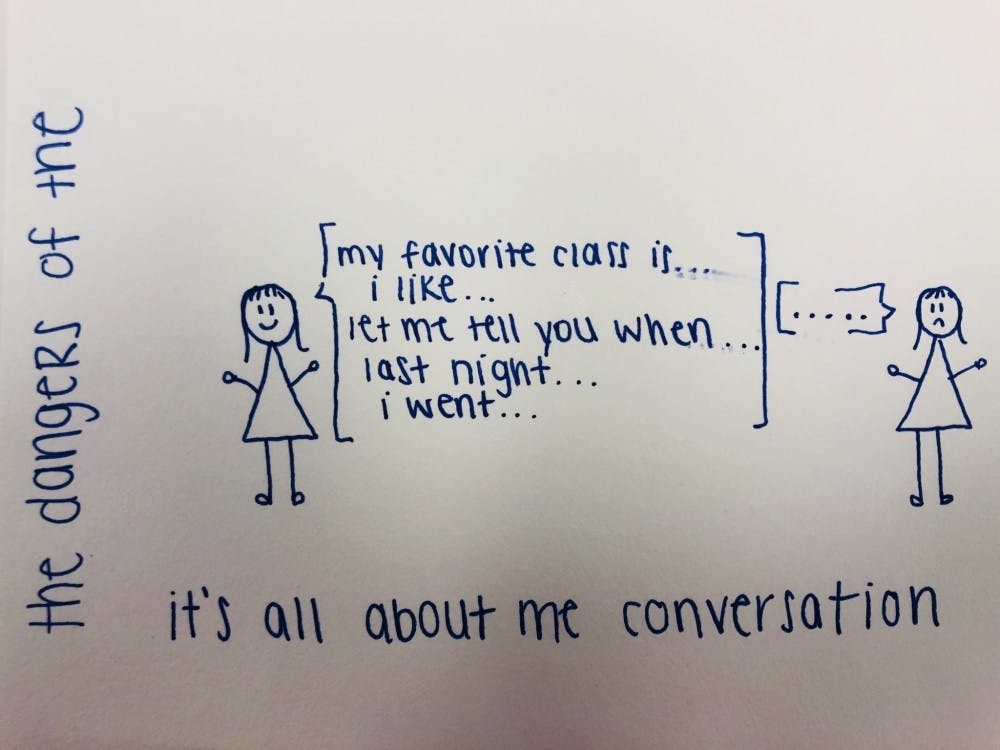I spent my summer surrounded by sand and sunshine at a country club summer camp, full of questioning little kids.
I sat down next to one of my nine-year-old campers, Heath, and figured he'd want to throw a football around or play with the guys. He didn't.
I asked if he wanted to go in the lake, or the pool or the playground. The answer was repeatedly "no."
Finally, I asked what he wanted to do, and I was surprised by his answer.
"I'd rather just swing and talk to you."
An active fourth-grader really wanted to sit on a beach chair and chat?
But he did.
Finding out what he liked through our conversations turned out to be a highlight of my summer.
Considering we're all in college and left our childhoods long ago, the concept of active listening might be deemed outdated, but consequently this skill retains equal if not greater prevalence later in life.
Listening doesn't mean waiting for our friends to finish talking before immediately launching into our own opinions.
I talk a lot. If you ask my friends, most of them will say I always have a story to tell. I wouldn't label myself as an extrovert, but as an observer of people and places, talking allows me to express my observations and opinions more easily and obtain responses.
Heath liked guessing games, such as when my birthday was or what my favorite color was. He liked swinging on the swings and chatting about his video games.
Enjoy what you're reading?
Signup for our newsletter
Similarly, at Miami, my closest friendships formed by asking my friends about their interests, what frustrates them and what they enjoy doing. I've bonded with friends over the common disgust of vegan food, Bagel & Deli Saturday lunches and hockey movies.
This quiet kid had sat alone in the sand, interacting with nobody until I sat down and showed interest in him. Two minutes into the guessing game, Heath was laughing, talking and asking tons of questions.
He looked and sounded like a different kid.
I wouldn't have known how to handle the situation if I hadn't asked for his opinion and listened.
It didn't occur to me how listening proves equally, if not more, important than talking until recently. I've been with friends at the library in the midst of telling a funny story only to be interrupted by a text message that demands immediate attention. It can get frustrating.
As a counselor, my main responsibilities were the safety and entertainment of these kids. I can't tell you how many sandcastles we constructed, how many sand buckets we brimmed with lake water and how many times we played tag across the sand, but I do remember my conversations with the kids.
In between countless rounds of applying sunscreen and weaving friendship bracelets, I learned about the campers. I learned about Eva's cheerleading competitions, how Gracie made it to nationals for dance and how Kendall has taken Chinese for six years.
We had a talent show at a camp a few weeks later, and because I'd taken the time to get to know the campers, I appreciated it so much more.
I discovered even the shyest people become more talkative if asked to talk about themselves. It makes sense. Each of us think we're pretty interesting and we all have stories worth sharing.
Those stories can't be shared and appreciated if our phones or another distraction takes precedence. I can definitely remember times sitting across the table from a friend at a dining hall, both of us scrolling through our phones. Once again, our social media. Our text messages. Our pictures.
We have to remember, it's not always about us.
Asking questions validates people and makes them feel worthwhile and important. Nobody, not a kid and certainly not an adult, wants to listen to another person talk incessantly or, worse still, become immersed in their own affairs once the conversation no longer centers around them.
We can also all admit to answering a text message or opening a snap while a friend is talking. It's a rude habit and unfortunately an all too common one. Putting down our phones and making eye contact during conversations illustrates the sincerity and interest that comprise a critical part of socializing.
If taking the time to listen to others made such a difference at a kids summer camp, just think of the impact it could have on us in college.




